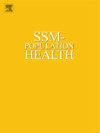The association between sports social capital and cognitive health: A longitudinal study of middle-aged and elderly adults in China
IF 3.1
2区 医学
Q1 PUBLIC, ENVIRONMENTAL & OCCUPATIONAL HEALTH
引用次数: 0
Abstract
This study examines the association between sports social capital and cognitive health in middle-aged and elderly individuals in China. Using data from the China Health and Retirement Longitudinal Study (CHARLS) and deep learning methods, we analyze interactions between sports social capital, cognitive function, and various health behaviors across multiple time points. Findings reveal that baseline cognitive scores and education are key predictors of cognitive health, consistent with cognitive reserve theory. Importantly, education amplifies the benefits of sports social capital, suggesting a synergistic effect that supports cognitive function. Results further show that sports social capital exerts a cumulative effect on cognition, with its influence increasing over time. Unlike general physical activity, sports social capital—formed through social engagement in sports—plays a unique role in sustaining cognitive function. Additionally, it is associated with a reduction in the cognitive risks of smoking and other behaviors, highlighting its potential role as a buffer against health risks. This research extends social capital theory in health contexts and suggests that promoting group sports activities that foster social support networks could serve as an effective intervention. Such policies, particularly among lower-education groups, may help preserve cognitive health within aging populations.
体育社会资本与认知健康的关系:中国中老年人的纵向研究
本研究旨在探讨中国中老年人体育社会资本与认知健康的关系。利用中国健康与退休纵向研究(CHARLS)的数据和深度学习方法,我们分析了体育社会资本、认知功能和各种健康行为在多个时间点上的相互作用。研究结果表明,基线认知得分和教育程度是认知健康的关键预测因子,与认知储备理论一致。重要的是,教育放大了体育社会资本的好处,表明一种支持认知功能的协同效应。结果进一步表明,体育社会资本对认知具有累积效应,其影响随时间的增加而增加。与一般的体育活动不同,体育社会资本通过参与体育活动形成,在维持认知功能方面发挥着独特的作用。此外,它与减少吸烟和其他行为的认知风险有关,突出了其作为健康风险缓冲的潜在作用。本研究将社会资本理论扩展到健康语境中,并提出促进团体体育活动以促进社会支持网络可以作为有效的干预措施。这样的政策,特别是在受教育程度较低的群体中,可能有助于保持老龄化人口的认知健康。
本文章由计算机程序翻译,如有差异,请以英文原文为准。
求助全文
约1分钟内获得全文
求助全文
来源期刊

Ssm-Population Health
PUBLIC, ENVIRONMENTAL & OCCUPATIONAL HEALTH-
CiteScore
6.50
自引率
2.10%
发文量
298
审稿时长
101 days
期刊介绍:
SSM - Population Health. The new online only, open access, peer reviewed journal in all areas relating Social Science research to population health. SSM - Population Health shares the same Editors-in Chief and general approach to manuscripts as its sister journal, Social Science & Medicine. The journal takes a broad approach to the field especially welcoming interdisciplinary papers from across the Social Sciences and allied areas. SSM - Population Health offers an alternative outlet for work which might not be considered, or is classed as ''out of scope'' elsewhere, and prioritizes fast peer review and publication to the benefit of authors and readers. The journal welcomes all types of paper from traditional primary research articles, replication studies, short communications, methodological studies, instrument validation, opinion pieces, literature reviews, etc. SSM - Population Health also offers the opportunity to publish special issues or sections to reflect current interest and research in topical or developing areas. The journal fully supports authors wanting to present their research in an innovative fashion though the use of multimedia formats.
 求助内容:
求助内容: 应助结果提醒方式:
应助结果提醒方式:


